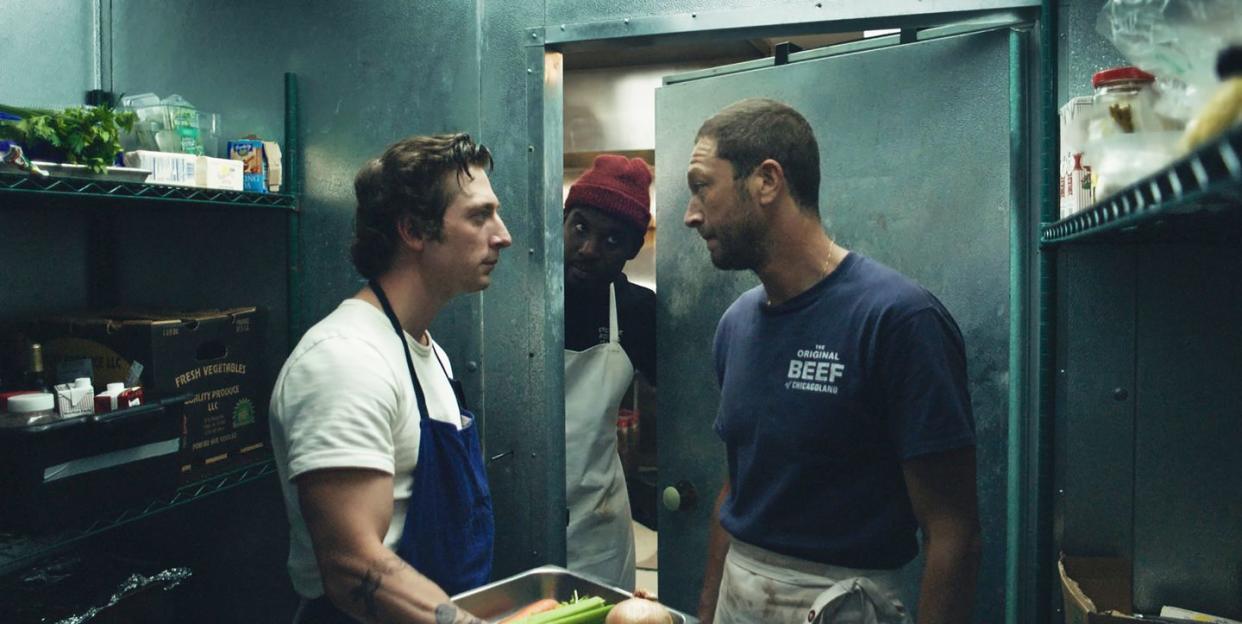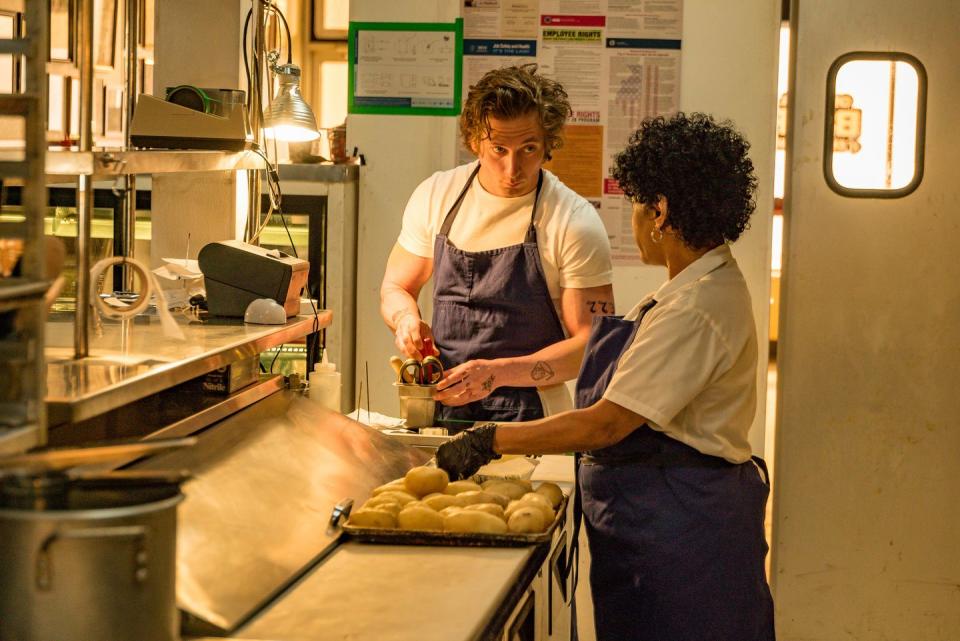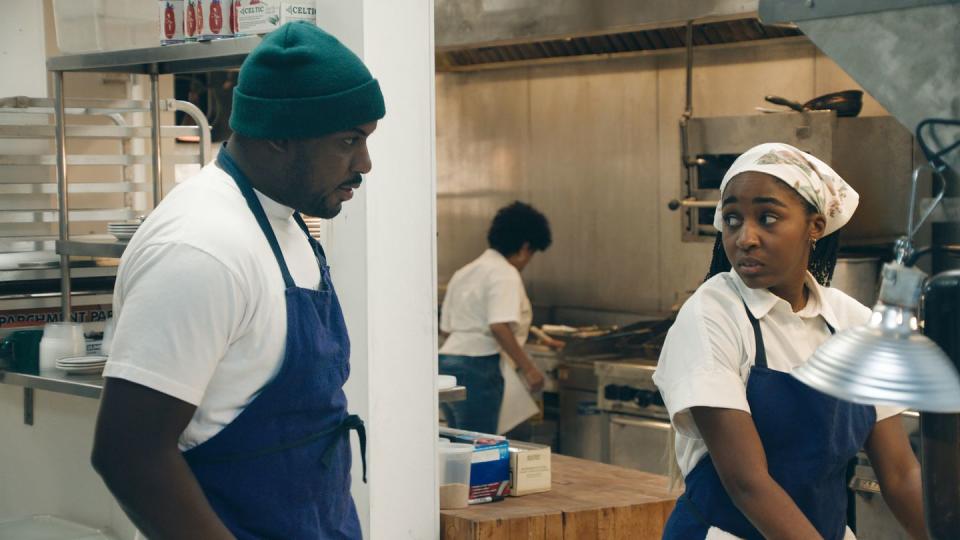In 'The Bear,' Food Is the Language of Love and Grief

When we’re introduced to Carmen “Carmy” Berzatto at the beginning of The Bear, he’s asleep in the storage room at The Original Beef of Chicagoland. This was his brother’s restaurant, we’ll find out, and before that, it belonged to his parents. Carmy is not the kind of chef you would usually find serving up sliced beef for working people on their lunch breaks though. We know because when he gets back to his desk, there is a stack of cookbooks that includes volume one of Mastering the Art of French Cooking and The Zuni Cafe Cookbook by Judy Rodgers. Empty bottles of Fernet-Branca are also a signal, but cookbooks will be the silent tell throughout the eight-episode series, signaling to the audience whether a character buys what Carmy is selling or not.
The Bear originally premiered on FX, but now that it’s streaming on Hulu, it’s become a hit with anyone who’s ever worked in a kitchen or written about food debating its accuracy. Though its depiction of Chicago has gotten some (deserved) flak, the show is still an honest depiction of work, family, grief, and the ways in which treating food as art can clash with the daily need for sustenance. Cooking is how the core characters communicate in The Bear, and even in the chaos of the kitchen, food stands for love. Carmy’s attempt to reimagine The Beef is not so much a business plan as it is an effort to reconfigure his and his family's life. It’s an attempt at the impossible, really: moving on in the thick of grief. Carmy doesn't exactly handle this challenge with grace—he fumbles multiple times throughout the season. But this isn't a show about perfection. It's about being able to keep picturing something better, even as everything else around you burns.
For Millicent Souris, a writer and cook who grew up in her family’s Baltimore restaurant, the depiction of kitchen life is deeply recognizable. “I just didn’t argue with it,” she says. “It’s like when the salt content on food is proper and you don’t think about it. It’s just kind of perfect. And I was like, ‘Huh, it’s good.’”
Carmy wants to make The Beef tighter, smoother, cleaner, with more care given to the staples that have made people regulars for decades. He’s trying to make it a better restaurant, and he’s doing it in the immediate wake of his brother Michael’s recent death by suicide after a struggle with painkiller addiction.
Bread crumbs about his impressive professional pedigree are spread throughout episodes: He’s been nominated for the James Beard Foundation’s Rising Star Chef award, he’s been a Food & Wine Best New Chef, and he’s worked at a restaurant—implied to be New York City’s Eleven Madison Park—renowned as the best in the world. (None of this matters much to most people; in one scene, an older family friend asks him how it feels to be a “piece of shit” who works at a restaurant.)

Despite the glamour of his old life, though, he recounts to his sister that he had been throwing up before his shifts out of anxiety. Inside The Beef—a space that’s new for him and old for those around him—he’s trying to marry the good parts of his rarified training with his family’s legacy. He wants to fix the restaurant because it’s a way of fixing his relationship to his brother.
Everyone who works in the kitchen, from tough-guy “Cousin” Richie Jerimovich (played by Ebon Moss-Bachrach) to line cook Tina (Liza Colón-Zayas) to Marcus (Lionel Boyce) in the pastry section and right on through to the dishwashers, knew Michael, too, and they’re all trying to move forward in the midst of loss—a pain that will be recognizable to anyone who’s had to work through tragedy rather than take the space to properly grieve, because no one else is around to pay the rent. When Richie slams down Carmy’s copy of the Noma cookbook, he’s mocking what he sees as an overly precious approach, and also he’s asking for something in his life to stay the same as when his best friend was alive.
Sydney Adamu, played by Ayo Edebiri, is another new addition to The Beef’s kitchen who comes with a Culinary Institute of America education and a stint at the three-Michelin-starred Alinea on her résumé. She sees the restaurant as a site of nostalgia (she’d go every Sunday with her dad growing up) and as a place where she would have something real to do, rather than spend six months zesting as she’d done in a fine dining kitchen. She quickly becomes Carmy’s ally in attempting to force order among the staff, yet they butt heads because of his aloofness and her impatience.
Sydney would love to eat at Noma, so she and Richie are constantly at odds, to the point that she accidentally stabs him before realizing the environment is bringing out the worst in her and quitting mid-shift in a daze. “The scene where Sydney walks out of the restaurant right before service because she’s tired of the bullshit was one of the most realistic scenes,” former line cook and now private chef Ryan McCarthy says, “because that’s usually how it happens.”

This push-pull between highbrow cuisine and down-and-dirty cooking, between the old ways and the new ones, comes at a particularly complicated moment in the history of food culture. Ever since Anthony Bourdain’s massive success in 2000 with Kitchen Confidential: Adventures in the Culinary Underbelly, chefs have been a figure of fascinating, appearing on TV in increasing numbers, lauded as the new rock stars, and put on the covers of magazines as “the gods of food.” But since Bourdain’s death and ongoing revelations about fine dining kitchens as toxic workplaces, there has been confusion about what exactly to do with this figure who’s been proven untrustworthy: an emperor with no clothes but a very expensive Japanese chef’s knife in hand.
Carmy offers a vision of the chef’s future. The Bear shows the miserable realities of working in fine dining—largely through Carmy’s nightmarish memories of being berated by a towering white-clad chef played by Joel McHale—but it also shows him wanting to change that pattern. When he screams at the staff in episode seven, he apologizes and continues to encourage Sydney and Marcus to follow through on new menu additions. Here, the intensity is accurate, yet the response builds toward the possibility of better conditions.
Shannon Roche, a former pastry chef and bakery owner who now manages a large wholesale bakery, recognized the endless sense of urgency that can turn a restaurant kitchen into a powder keg. “The pressure is always on; something’s always going wrong; the health inspector is always walking in at the worst possible moment, when you’re doing something you shouldn’t be doing,” she says. “All of that felt really real.”
And so, the show asks, how do we take what’s good about a $300-per-head fine dining experience and apply it to a neighborhood restaurant? How do we make every restaurant kitchen a decent workplace? The Bear asks these questions against a backdrop of grief, and thus also asks, when cooking is our way of communicating, how do we use it to heal ourselves and those around us?
The character Marcus undergoes the greatest transformation in the show, starting out as a bread baker making the sandwich loaves too dense and becoming a pastry chef with pages from Carmy’s cookbooks photocopied and pasted to the wall of his section. Making things from scratch is a revelation for him, having come from the automation of McDonald’s. His obsession with perfection leads him to start sleeping at the restaurant to watch his fermentation projects (taken from The Noma Guide to Fermentation).
From chocolate cake to doughnuts, Marcus’s tour down the rabbit hole of pastry is recognizable to anyone whose notebooks are filled with notes on 15 batches of the same recipe (including, admittedly, me). In Marcus and, to a lesser extent, Tina—who comes to understand the power of attention and herbs through mashed potatoes, and has tears in her eyes over Carmy’s chicken piccata—the audience sees how the obsessive chef is born. In Carmy and Sydney, they see how that obsession can become a source of dread and insecurity.
Of course, The Bear is fiction, not a documentary, and thus Season 2—which is hinted at in the surprising splendor of the final episode—will likely continue to lean on random shoot-outs, electricity outages, and jail visits for its tension. But I hope the tenor of the kitchen will stay the same. Souris said to me, “People want restaurants to be utopias.” They can’t be, because they’re places of hard work where human beings are trying to get something done. That doesn’t mean they have to be miserable though.
In Carmy, Sydney, and Marcus, The Bear has three characters who are trying to untangle what it means to love cooking and serving food when the professional environment for doing so doesn’t always support people’s best behavior. In them, there is some hope for the future of the chef.
You Might Also Like

